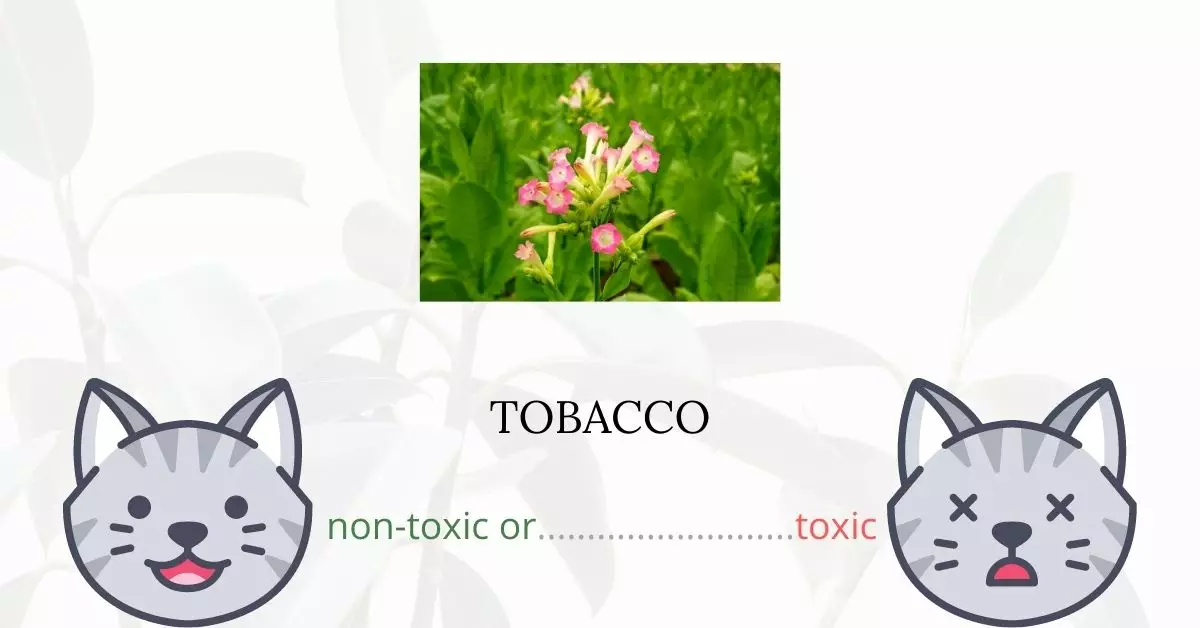Tobacco is indeed toxic to cats, containing hazardous chemicals such as nicotine, anabasine, anatabine, germacrene, and nornicotine which pose severe risks to their well-being. As cats are smaller animals, exposure to even minimal amounts of these substances can be life-threatening; with nicotine rapidly infiltrating the bloodstream, liver, and intestines. Signs of poisoning may manifest between fifteen minutes to an hour and a half after ingestion, initially presenting as heightened excitement and hyperactivity in the affected feline.
This article has been meticulously crafted in collaboration with a team of experienced Doctors of Veterinary Medicine (DVMs). Their invaluable insights and extensive knowledge have enriched the content, enabling us to deliver precise and current information regarding the potential dangers of various plants, focusing on tobacco in this instance, and their impact on cats. To ensure the utmost accuracy and reliability, our research extends to high-authority resources such as ASPCA and PetMD, scrutinizing each plant’s potential to harm our feline friends.
Clinical Signs of Tobacco Poisoning in Cats

When a cat comes into contact with, smells, or ingests tobacco, the myriad chemicals present, predominantly nicotine, can induce a range of symptoms. Here’s a detailed look at these clinical signs and the reasons behind their occurrence:
- Vomiting & Diarrhea: These are the body’s immediate reactions to expel the toxin. Nicotine irritates the stomach lining, causing the cat to vomit, and disrupts the digestive system, leading to diarrhea.
- Slow Pulse: Nicotine can affect the cat’s cardiovascular system, slowing down the heart rate as a potential side effect.
- Dizziness & Loss of Coordination: The toxin affects the cat’s central nervous system, causing disorientation and difficulty in maintaining balance.
- Malaise: A general feeling of discomfort or uneasiness, often an early sign that something is amiss.
- Hyperexcitability & Mental Confusion: The nervous system’s response to the stimulant properties of nicotine, leading to erratic behavior and confusion.
- Depression: As the toxic effects advance, they may depress the cat’s central nervous system, resulting in lethargy and disinterest in its surroundings.
- Collapse & Weakness: A result of the body’s overwhelming response to the toxin, leading to physical debilitation.
- Myalgia: Muscle pain due to the strain put on the muscles by the toxin and the cat’s subsequent reactions.
- Diaphoresis: Excessive sweating or a damp coat caused by the body’s attempt to eliminate toxins.
- Hypertension: An elevated blood pressure resulting from nicotine’s stimulant properties.
- Respiratory Muscle Paralysis & Respiratory Failure: In severe cases, nicotine can paralyze the muscles responsible for breathing, leading to respiratory distress and potential failure.
- Asystole: A complete cessation of heart activity, which is a dire sign.
- Death: In the worst-case scenario, if the toxin isn’t treated promptly and the symptoms intensify, they can culminate in the tragic demise of the feline.
It’s paramount to note that nicotine acts quite swiftly, and in large doses, severe symptoms or even death could manifest before many of the aforementioned clinical signs appear. Immediate veterinary care is imperative if tobacco ingestion or contact is suspected.
First Aid and Treatment of Tobacco Poisoning in Cats

Your veterinarian will conduct a differential diagnosis to rule out any other possible causes for the feline’s symptoms. A physical examination, a review of the feline’s medical history, and a consultation with the pet owner will all precede the diagnostic process.
The vet may initially induce vomiting to get the rest of the plant out of your cat’s stomach. He will also give your cat activated charcoal, which neutralizes the poisons in the tobacco.
If your cat has suffered from continuous vomiting and diarrhea, the vet may administer fluids and electrolytes to help her rehydrate and restore her electrolyte storage.
Your cat may also be given atropine to treat symptoms of irregular heartbeat. Other prescribed medications may be also given depending on the cat’s condition.
If your cat has been exposed to enough tobacco plants to cause breathing problems, she may be given oxygen. Depending on her condition, she may need to be admitted to the hospital for the night.
Recovery from Tobacco Poisoning in Cats

The best results come from prompt veterinary care. Because the toxins can have long-term consequences, your cat will need to return to the vet for follow-up consultations. While your cat is recovering, make sure she has a quiet place to rest and recuperate.
Prevention of Tobacco Poisoning in Cats
Be cautious in using products containing nicotine. Keep them in a place that your cat cannot access. If tobacco plants are growing nearby your place, it is best to limit your cat’s access outdoors. This will reduce the risk of exposure to toxic plants.
If you love plants but have cats at home, check out these lists:





